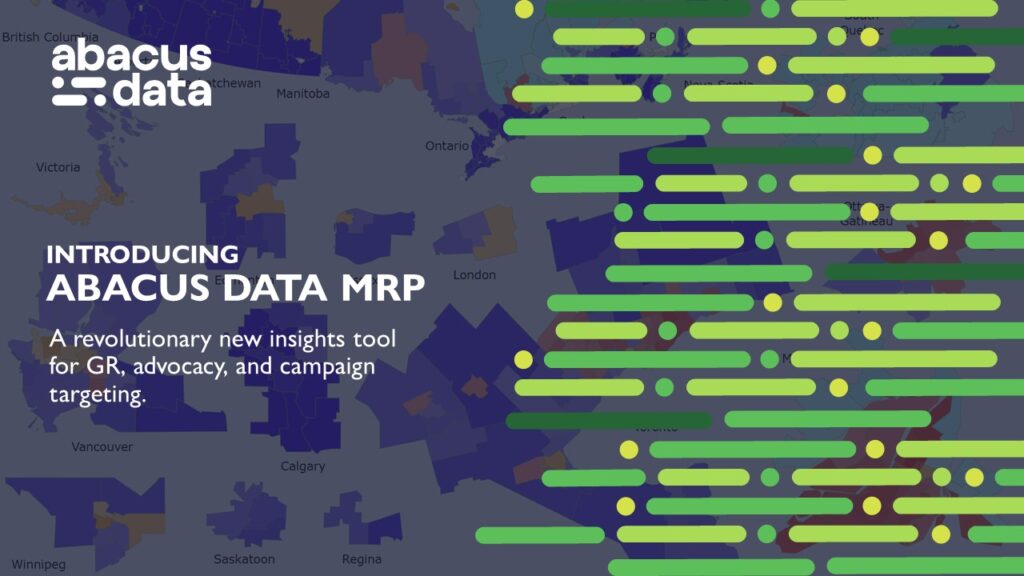What Americans think about Canada, tariffs, and a possible trade war: GZERO Media / Abacus Data poll
It’s been over a week since President Donald Trump’s inauguration and we are waiting to see whether he imposes the tariffs he said could come into effect on February 1. Trade tensions between the United States and Canada are once again front and centre. Given this, I’ve been wondering what American public opinion is on all of this. So I conducted a survey in partnership with our friends at GZERO Media.
I wanted to assess whether Americans support hardline trade actions, or whether Canada’s longstanding reputation as a friendly neighbour can still carry the day. I was also interested in what President Trump’s supporters though.
The GZERO/Abacus Data survey of 1,500 eligible voters in the United States —conducted January 23 to 24, 2025—offers valuable insights into how everyday Americans view Canada and the bilateral relationship.
What Americans Think About Canada
Overall, Americans hold Canada in high regard. The country’s net impression score sits at a robust +61, placing it among the most positively viewed foreign nations we tested with Australia seen only slightly more positively.
This friendly sentiment is further underscored by the fact that over half of respondents (54%) describe the U.S.-Canada relationship as that of “best friends” or “close friends,” while few see Canada as a rival or potential adversary. However, not all Americans share the same intensity of positivity. Respondents in Northeastern states and those who voted for Kamala Harris in the 2024 election show particularly warm feelings, while Trump voters and residents of the Great Lakes/Midwest region are a bit more reserved. As trade disputes loom, these subgroup differences may help explain why certain Americans might be more receptive to escalated rhetoric—or more cautious about risking an alliance.



Perceptions about CUSMA/USMCA
Despite ongoing debates over trade policy, most Americans view CUSMA or USMCA favourably, especially when they learn that it was first negotiated by President Trump in 2018. Overall, just over half (52%) of respondents think the deal has been “very good” or “good” for the United States, compared to only 10% who deem it “bad” or “very bad,” while 38% remain neutral.

Among Republicans and Trump voters, however, the numbers are strikingly positive. A full 32% of self-identified Republicans rate the agreement as “very good,” with another 33% calling it “good.” The pattern is nearly identical among Trump voters: 32% “very good” and 33% “good,” indicating that fully two-thirds of Trump supporters have a favorable perception of the deal. Only 7% of Trump voters categorize it as bad or very bad, reinforcing their confidence in the agreement’s benefits.

This heightened approval appears to stem from the belief that President Trump secured advantageous terms for U.S. industries and workers. While voters from other parties—particularly Democrats—offer more tempered views, CUSMA clearly stands out as a Trump-era policy that resonates strongly with his base, reinforcing their support for his more aggressive trade posture. And it’s highly likely that President Trump could shift the views of his base to see the deal as ineffective today and in need of renegotiation.

More Context – What do Americans think and believe?
Americans hold a wide array of beliefs—some accurate, some misinformed—about Canada and the nature of the two countries’ economic relationship. As the possibility of another tariff fight looms, these perceptions matter greatly, shaping how receptive Americans might be to stiffer trade barriers or more aggressive rhetoric.
One of the clearest findings is that an overwhelming majority (86%) believe Canada and the United States are allies. Similarly, 84% accept that free trade between the two countries generally makes both better off. Yet alongside this goodwill, 56% also believe that Canada benefits “way more” from free trade with the U.S. By seeing Canada as the bigger winner, many Americans could be more inclined to back tariffs meant to “rebalance” perceived inequalities.
These attitudes intersect with beliefs about energy independence. A majority (65%) of Americans think the U.S. produces enough oil domestically to meet all of its needs, including a notably high proportion of Trump voters (75% when combining “definitely true” and “probably true”). Such confidence may diminish the perceived need for Canadian energy imports, making it easier for Trump to argue that imposing tariffs on Canada won’t spike gas prices or otherwise hurt domestic consumers.
Perceptions about defense also factor into Americans’ willingness to pressure Canada economically. Although 68% agree Canada contributes its fair share to NATO, when a split sample is showed the opposite claim, a full 48% simultaneously believe that Canada does not pay its way in defending North America. Among Trump voters, 62% see Canada as contributing too little, and more than half (54%) even consider Canada’s military “pretty much non-existent.” In contrast, only 36% of Harris voters think Canada’s military might be negligible. These views echo Trump’s longstanding criticism of allies for insufficient defense spending, fueling a sense that Canada “owes” the United States on multiple fronts—whether it’s financial or in trade concessions.

Other views amplify the sentiment that Canada may be taking advantage. About 1 in 3 Americans believe “most Canadians want their country to become the 51st state,” (despite Trump’s claim to that effect) and 44% think “millions of illegal immigrants” enter the U.S. from Canada. Only 32% believe Trump’s claim that much of the fentanyl in the U.S. originates across the northern border, although Trump voters are more likely to (42%). Although these are significantly overstated, they have real political implications: if voters accept that Canada is lax on border control or that Canadians themselves want deeper U.S. integration, they may see no harm in raising the stakes.



Interestingly, Saudi Arabia—which many Americans also regard as an important energy partner—elicits a more mixed response. Only about half (48%) of Americans consider Saudi Arabia a “friend,” and partisan differences are modest, suggesting Americans are split on the reliability of Saudi Arabia as an ally. By contrast, the vast majority call Canada a friendly nation. That being said, confidence that the U.S. can supply its own oil could overshadow Canadians’ potential value as a stable energy partner, at least among certain segments of the public.
All of these beliefs—especially the idea that Canada benefits unduly from free trade and invests too little in defense—make it easier for Trump’s base to support imposing tariffs. Indeed, a voter who thinks Canada is simultaneously freeriding on security, receiving disproportionate trade advantages, and failing to secure its own border is primed to back punitive measures if Trump argues they are necessary to protect American workers and taxpayers. That the broader public generally sees Canada favourably only somewhat tempers the possibility of a trade clash: Americans can like Canadians personally yet still believe they are “free riders” in urgent need of correction.
Nonetheless, the findings also show deep reservoirs of goodwill. Large majorities call Canada an ally, and 84% agree free trade is better for both sides overall. This underscores the complexity of public opinion: Americans can admire Canada’s closeness while endorsing trade restrictions if they suspect the United States is being shortchanged. For Canadian leaders and communicators, countering misconceptions—about energy dependence and migration while demonstrating it’s commitment to increase defence spending —may be crucial in defusing support for tariffs. By emphasizing the mutual benefits of open markets and highlighting Canada’s role in collective security, Canadians might sway those on the fence, even if more ardent Trump supporters prove harder to convince.
American Energy Sources – Perceived and Preferred
Digging deeper into energy, we asked Americans where they think they get most of their foreign crude oil and where they would prefer to get their oil.
One of the most striking insights from our survey is the gap between Americans’ perceived and preferred source of foreign oil. When asked which country currently supplies the most oil and gas to the United States, a majority (53%) point to Saudi Arabia, while only 22% choose Canada. In reality, Canada is the top foreign supplier, but many Americans’ first thought is that Middle Eastern oil dominates U.S. imports. This perception highlights lingering misconceptions about North American energy flows and underscores why some Americans may not feel a strong sense of dependence on Canada.

Yet, when Americans are asked where they would prefer the United States buy oil if imports remain necessary, the picture changes drastically. A full 52% choose Canada, far eclipsing Saudi Arabia (19%), Mexico (12%), Norway (7%), Russia (6%), and Venezuela (4%).
This preference for Canadian oil holds across regions, and there’s little difference between voters who supported Kamala Harris (58%) and Donald Trump (51%). Even so, the overall majority in every subgroup opts for Canada as their top choice supplier. These findings suggest a contradiction: many Americans see Saudi Arabia as the current leading supplier—possibly due to high-profile media coverage or long-standing U.S.-Saudi relations—while simultaneously viewing Canada as the ideal partner going forward.


The Possibility of 25% Tariffs on Canada
As we wait to see what happens on February 1, the proposed 25% tariff on Canadian-made goods reveals notable divides in American public opinion—both along partisan lines and between those living in border states versus elsewhere. While our story has already illustrated Americans’ complex mix of goodwill toward Canada and suspicions of “unfair” trade, this survey shows exactly how Trump voters, Harris voters, and residents of states adjoining Canada are sorting themselves on the issue.
Overall, 28% of Americans call the tariffs a “very good” or “good” idea, while 39% rate them “bad” or “very bad.” Yet when we break things down, partisan contrasts are stark. Among Trump voters, 44% describe the tariffs as a good or very good idea, compared to just 16% who think they are bad or very bad (the rest say “okay” or “don’t know”). By contrast, Harris voters come out heavily against the policy: only 15% back the tariffs, while 65% label them “bad” or “very bad.” This chasm reflects Trump voters’ belief that Canada gains more from trade and can better absorb the shock, whereas Harris voters—less convinced of a massive bilateral imbalance—are more concerned about economic disruption and diplomatic fallout.

A similar pattern emerges on the question of how tariffs will affect prices and the broader U.S. economy. Nationally, 25% foresee a positive effect on their cost of living, but 45% predict a negative one. Those in border states are especially likely to anticipate higher prices: 31% there think the impact will be negative or very negative, and just 19% anticipate a positive outcome. By contrast, Trump voters—regardless of region—are more sanguine. Around 36% of them see tariffs as benefitting America’s economy, compared to only 22% of Harris voters.

Border-state respondents, who often have direct business or personal ties across the boundary, also register more concern about the U.S.-Canada relationship deteriorating under tariffs. In these states, 44% think the tariff could have a negative effect on bilateral ties, while only 27% call it positive. Their vantage point might be shaped by potential disruptions to cross-border supply chains and local commerce. Meanwhile, in regions further from Canada, the negative ratings on U.S.-Canada ties are somewhat lower—suggesting that those communities might be less directly impacted, or at least less immediately aware of potential fallout.


Retaliatory measures add another layer. Nearly half (47%) of Americans overall fear that Canadian counter-tariffs would harm them personally, but this concern is more pronounced in border states (where consumers and businesses may rely on Canadian goods). Among Trump voters nationwide, however, only about a third see Canadian retaliation as a serious threat; many believe the U.S. can weather whatever Canada imposes, in part due to a perception of America’s superior economic clout.



Put together, these data illustrate both a wide partisan gap and important geographic nuances. Trump’s core voters largely back the tariff plan—some out of faith in his negotiating style, others due to the belief that Canada benefits disproportionately. Harris voters, on the other hand, mostly fear rising prices and diplomatic damage. And those closest to the border, who are often the most entwined with Canadian industries, are likelier to expect real negative consequences for everyday commerce and the broader relationship.

All of this reinforces the central tension: while many Americans like Canada and prefer its oil and other imports, the idea of punitive tariffs still holds appeal among a significant faction—particularly Trump supporters—who believe the U.S. has long been shortchanged. Whether that sentiment prevails will depend on how clearly Americans see the on-the-ground impact, especially in border communities that stand to feel the effects first.
Upshot
These findings paint a portrait of an American public torn between longstanding goodwill toward Canada and the view that Canada may be getting the better end of existing trade deals. On one hand, most Americans describe Canada as an ally, and large majorities agree that free trade is mutually beneficial. Many also prefer Canadian oil over imports from other countries and acknowledge Canada’s cultural and political closeness to the United States.
On the other hand, more than half believe Canada benefits “way more” from free trade, echoing President Trump’s narrative that tariffs are needed to level the playing field.
The gulf between Trump and Harris voters is pronounced. Trump voters not only show higher support for a 25% tariff, but they are also less concerned about the possible negative impacts on the U.S. economy and consumer prices. Harris voters, meanwhile, strongly oppose tariffs and worry about the ripple effects on inflation, diplomatic relations, and cross-border supply chains. These partisan divergences reflect different assumptions about who truly gains from trade and whether Canada meets its defense and immigration responsibilities.
Geography further complicates the picture. Americans in border states—who are more directly involved in commerce and travel with Canada—register deeper anxiety about the fallout from a potential trade war. They are likelier to anticipate higher prices and potential harm to local industries if tariffs escalate. This underlines the importance of these border communities: their direct exposure to cross-border trade could serve as a bellwether for how the broader American public will ultimately judge the practicality and fairness of tariffs.
For Canadian policymakers and business leaders, the lesson is that American goodwill can coexist with a willingness to “get tough” if voters feel the United States is being taken advantage of. Countering misconceptions about energy dependence, highlighting Canada’s defense contributions, and showcasing tangible economic interdependencies—especially in border regions—will be critical. The more Canadians can demonstrate that these punitive measures undermine shared prosperity, the likelier they are to sway uncertain or moderate Americans and mitigate the worst outcomes of an escalating trade dispute. But we also have to be aware that Trump voters are captive to his rhetoric and what they think and feel is likely all he cares about.
Methodology
The survey was conducted with 1,500 American eligible voters from January 23 to 24, 2025.
A random sample of panelists were invited to complete the survey from a set of partner panels based on the Lucid exchange platform. These partners are typically double opt-in survey panels, blended to manage out potential skews in the data from a single source.
The margin of error for a comparable probability-based random sample of the same size is +/- 2.6%, 19 times out of 20.
The survey was weighted according to census data to ensure that the sample matched the U.S. population by age, gender, region, race, and education.
This survey was paid for by Abacus Data Inc.
Abacus Data follows the CRIC Public Opinion Research Standards and Disclosure Requirements that can be found here: https://canadianresearchinsightscouncil.ca/standards/
ABOUT ABACUS DATA
We are Canada’s most sought-after, influential, and impactful polling and market research firm. We are hired by many of North America’s most respected and influential brands and organizations.
We use the latest technology, sound science, and deep experience to generate top-flight research-based advice to our clients. We offer global research capacity with a strong focus on customer service, attention to detail, and exceptional value.
And we are growing throughout all parts of Canada and the United States and have capacity for new clients who want high quality research insights with enlightened hospitality.
Our record speaks for itself: we were one of the most accurate pollsters conducting research during the 2021 Canadian election following up on our outstanding record in the 2019, 2015, and 2011 federal elections.
Contact us with any questions.
Find out more about how we can help your organization by downloading our corporate profile and service offering.




































































